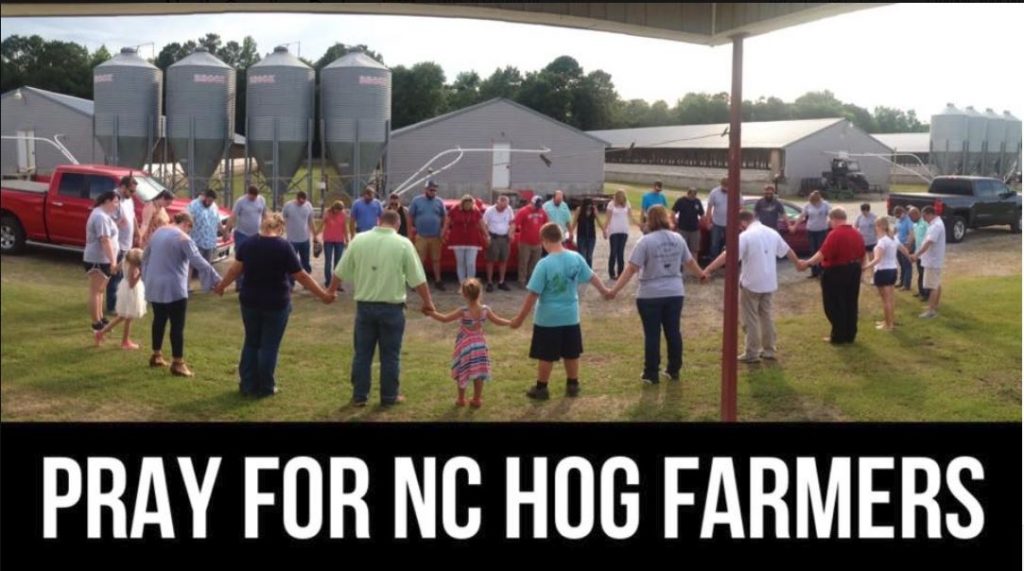
Neighbors and friends recently gathered to pray for the Carter family, whose farm is on trial in Raleigh. (Facebook photo by Candice Eller Morgan)
It was something to behold in the federal courtroom – a Texas lawyer going after Duplin County hog farmer Joey Carter.
For three days, Michael Kaeske pounced, working and searching to trip Carter up on words and documents from decades past.
Importantly, the lawyer disregarded Carter’s investment in new methods, including expensive irrigation equipment that clearly has the effect of minimizing odor at his farm.
The Texas lawyer dismissed much more, including Carter’s embrace of other alternative technology. The record shows that Carter allowed installation of a prototype system on his farm. The idea was to try and recycle water and eliminate all odor on the farm.
Indeed, Carter was featured in newspapers in the 1990s for allowing the project and inviting the public to the farm to see it. Back then, Carter was quoted in the paper about his hopes for the project. Like so many such efforts, it failed to succeed. But not for a lack of trying. And, now, some 23 years later, the lawyer was trying to use Carter’s own words from a 1995 newspaper article against him in a courtroom in Raleigh.
At one point, from the stand, Carter spoke well about the plaintiff, Elvis Williams, a self-described “loner” who is bringing the lawsuit with his wife against the Carter farm.
Carter said that he and Williams, his former high school classmate, often run into each other at a local breakfast spot and they like to talk about Carolina basketball. At one point, Carter said he thought of him as a friend.
Kaeske sought to undermine even that, badgering the farmer with a series of questions: You don’t have his phone number stored in your phone, do you? You’ve never been inside his house, have you? Your wives don’t socialize together, do they?
The Texas lawyer demanded to know: You two actually don’t share any common friends, do you?
Well, the farmer answered, if you’re a Carolina basketball fan then I’d have to say you surely are his friend.
The lawyer from Texas even discounted Carter’s willing efforts to help neighbors, some of whom live much closer to the farm than the plaintiff. One example: He heard a family in the neighborhood may go without Christmas presents, and so he went to the store and ensured that wouldn’t be so.
Another: He moved the collection point for his on-farm mortality after neighbors raised a concern. That’s what happens in real life.
Kaeske scoffed, saying you might make little fixes, but you surely can’t stop the smell coming from your hogs.
Joey Carter, a man who had dedicated his career to serving others as a firefighter and police officer in his small town, had a simple explanation:
Well, he said, I don’t believe there is an odor problem like the people suing my farm say and, sure enough, no one ever complained about any odor until they signed up for the lawsuit.
Undeterred, the Texas lawyer pressed ahead.
Let’s assume that it did smell, Kaeske said. You certainly couldn’t fix that by yourself, could you?
Well, like I said, no one has ever complained to me about the odor and it’s not like you say it is, Carter repeated.
The Texas lawyer wouldn’t listen.
He didn’t care what Joey Carter had done for his community. He didn’t care what he had done for his neighbors.
You see, this was an honest, hard-working farmer.
The testimony showed that Joey Carter built his farm with his own hands, nail by nail. And he cares deeply about his community. And he doesn’t harm it like the lawyer wants people to believe.
But you see, some people will say anything to try and win some money.
And other people are left to pray that a jury will understand that.
– Andy Curliss, CEO
